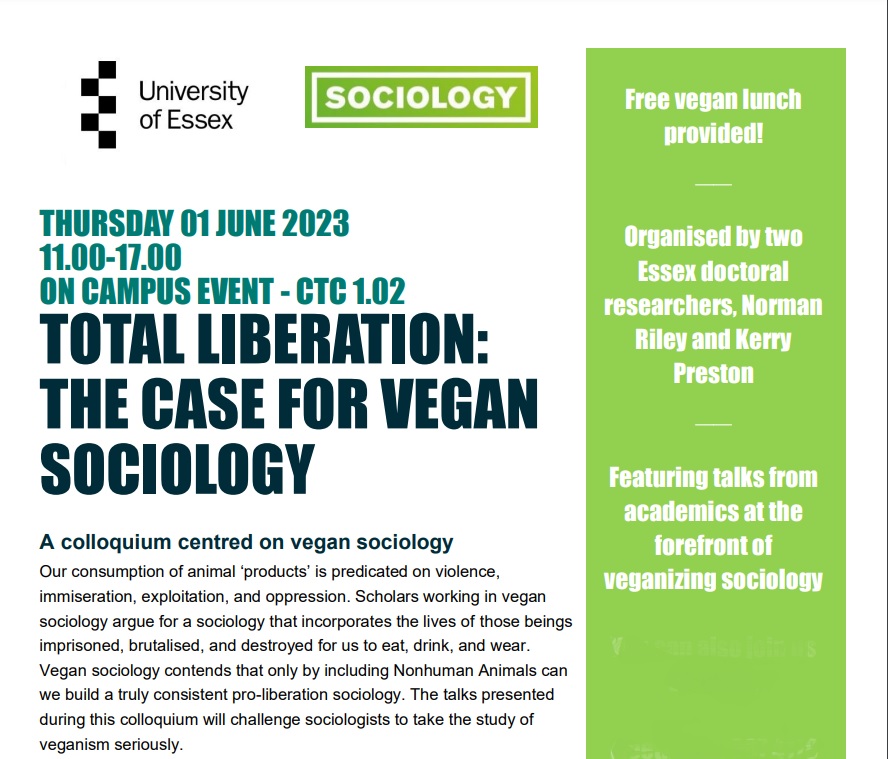A summary of my conference paper presented on 8 October 2023 at the International Association of Vegan Sociologists (IAVS) Annual Conference: Vegan Intersectionality
Lauren-Marie Kennedy
University of Dundee
Sociology, like much of feminism, conveniently forgets to mention nonhuman animals in much of the research/literature and since animals too can be socialised, this conference on Vegan Intersectionality, therefore, is extremely relevant and timely. Gender is another factor which contributes to social injustice issues, yet many may not realise the overlapping nature of human and nonhuman animal oppression in our culture, especially based on gender.
Women and nonhuman animals are often simultaneously exploited. As an example, a UK dairy product brand The Laughing Cow paints an idealistic picture of happy, ‘laughing’ cows who consume their own produce with smiling friends. Interestingly, female voiceover actors are preferred for these kinds of advertisements and this is something The Laughing Cow take full advantage of. It is not enough for the dairy industry to exploit the female cows used in the production of The Laughing Cow products, they must also use the female human voice-over to promote a product which, ironically, takes away women’s voices and choices.
The animal rights movement is not perfect, however, and chose to be single-issue focussed which has in turn harmed its female volunteers, especially. Vegan women are essentially treated as a ‘gateway’ into veganism, a temptation for a (mostly heterosexual) male target audience to try and test to see if they would consider switching lifestyles. Common campaign slogans such as ‘eat pussy, it’s vegan’ and ‘vegans taste better’ clearly indicate that the vegan female body is being commercialised by the movement as an edible ‘way in’ to veganism, which should be more harshly criticised than it currently is.
Contrary to popular belief, vegans do not generally place themselves above anyone else and we choose to live in a way which reflects exactly that – rejecting unnecessary and archaic ideas of species hierarchy. The mainstream media would have us believe otherwise though and perpetuate ignorant views about the lifestyle which studies show contributes to public perception (Greenebaum and Dexter, 2018; MacInnis and Hodson, 2017; Merriman, 2010; Wood, 1994/2013). The fact that most of the popular UK newspapers report about veganism negatively (MacInnis and Hodson, 2017, p. 738) and that women may experience harsher discrimination for their choosing to be vegan are among the findings from recent studies on this topic (Merriman, 2010, p. 423). Sadly, the evidence is growing and I am already seeing this in my own Master’s thesis research which is highlighting how vegans and non-vegans perceive veganism and gender expectations/stereotypes.
I would like to note my gratitude and appreciation to Corey Wrenn and all who organised and took part in this event. It was a joy to be an honorary vegan sociologist for the day and speak at such an interesting and important conference. Together, I hope we can make the world a better place by educating others on vegan issues and taking back our own narrative, which has been distorted and warped by non-vegans in the media who are sadly afraid of change.
Presented at this conference were ideas which inspired my dissertation-turned-book, ‘The Gendered Politics of Veganism’. I have only touched the surface in this summary blog post and would strongly recommend checking out the conference and my book to learn more.
Bibliography
Greenebaum, J. and Dexter, B. (2018) ‘Vegan men and hybrid masculinity’, Journal of Gender Studies, 27(6), pp. 637-648. DOI: 10.1080/09589236.2017.1287064.
MacInnis, C.C. and Hodson, G. (2017) ‘It ain’t easy eating greens: Evidence of bias toward vegetarians and vegans from both source and target’, Group Processes & Intergroup Relations, 20(6), pp. 721–744. DOI: 10.1177/1368430215618253.
Merriman, B. (2010). ‘Gender differences in family and peer reaction to the adoption of a vegetarian diet’, Feminism & Psychology, 20(3), pp. 420–427. DOI: 10.1177/0959353510368283.
Wood, J.T. (1994/2013) ‘Gendered media: The influence of media on views of gender’, Gendered lives: Communication, Gender and Culture, 7, pp. 31-41. Available at: https://www.semanticscholar.org/paper/Gendered-Media%3A-The-Influence-of-Media-on-Views-of-Wood/e6ee0a6d1f5a53ba148f37af50b1ebaefedcb56a.

